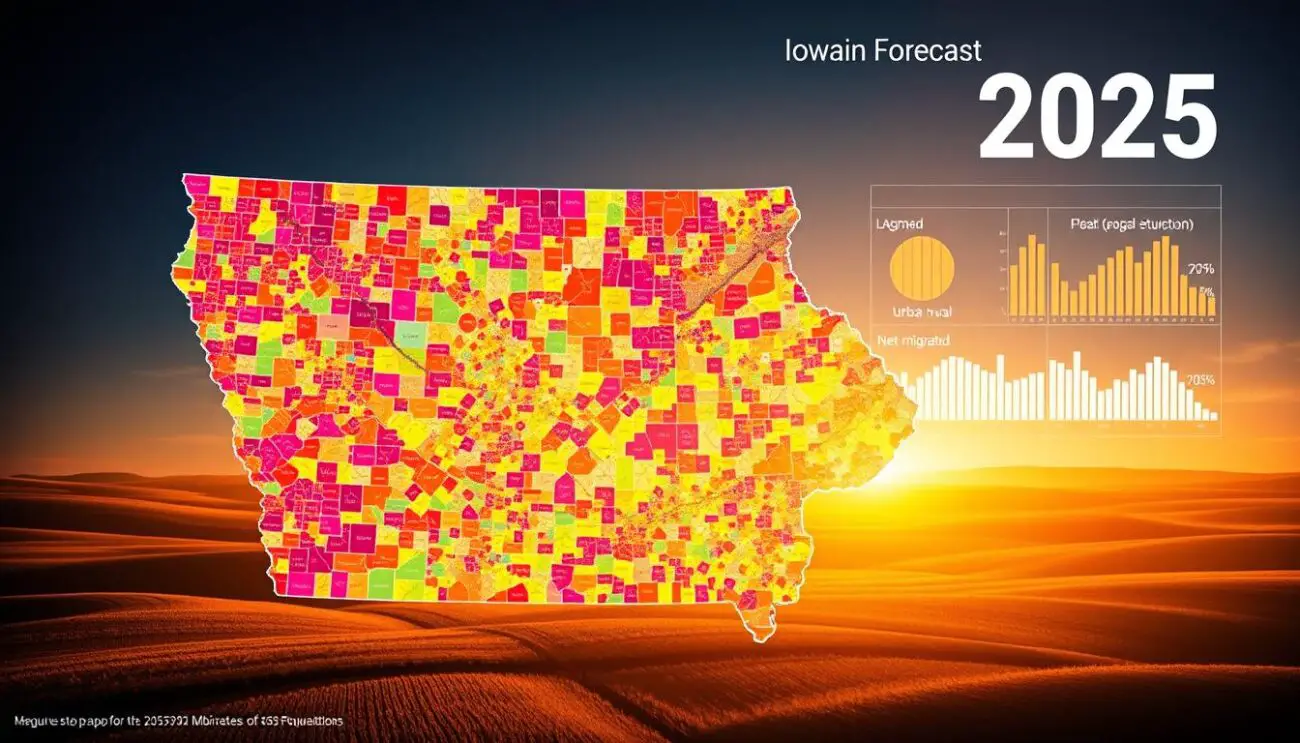Iowa’s population is expected to hit 3.21 million by 2025. This growth has been steady over the last decade. It’s driven by a 0.4% annual increase from 2010 to 2022. This trend is key for planning in cities, schools, and healthcare.
In Iowa, most people are White, making up 87.93% of the population. Then there are those identifying as Two or more races at 3.89%, and Black or African American at 3.74%. The gender split is almost even, with 50.01% males and 49.99% females. The median age is 38.3 years, with about 22% of adults being seniors. This will shape Iowa’s future.
Key Takeaways
- Iowa’s population is projected to reach 3.21 million in 2025.
- The average annual growth rate from 2010 to 2022 was 0.4%.
- The racial composition of Iowa’s population is predominantly White.
- The gender distribution is nearly balanced.
- The median age of Iowa’s population is 38.3 years.
- Approximately 22% of the adult population are senior citizens.
- Understanding population forecasts is crucial for informed decision-making in areas such as urban planning, education, and healthcare, which will be essential for iowa population 2025 and iowa demographics projection.
Historical Demographics and Current Population Patterns in Iowa
Iowa’s population has grown steadily since 2000, reaching 2023 levels. The iowa census data shows this increase. The state’s median age is 38.3 years, with 22% of adults being seniors. This information is key to understanding Iowa’s future.
The growth rate iowa 2025 is expected to keep rising. This is due to migration and natural growth. It’s important to look at Iowa’s past and present to grasp these trends.
- Migration patterns: Iowa has seen a steady flow of new residents, boosting its population.
- Natural population growth: Births and deaths in Iowa also play a role in its population growth.
- Urbanization: The spread of people in cities like Des Moines and Cedar Rapids is a big part of Iowa’s demographics.
By studying these elements and the iowa census data, we can understand Iowa’s population better. This helps us see what the future holds for the state.
Iowa Population 2025: Comprehensive Forecast Analysis
Recent data shows the U.S. population grew by about 1.0% from 2023 to 2024. Iowa’s population growth mirrors this trend. The state’s demographics are shaped by migration and life expectancy.
The table below gives an overview of Iowa’s population forecast:
| Year | Population Projection |
|---|---|
| 2025 | 3.2 million |
| 2030 | 3.4 million |
| 2040 | 3.6 million |
Iowa’s demographics are set to change a lot over the next 40 years. The age structure and older population will see big shifts. Understanding these changes is key to grasping Iowa’s future and its impact on the economy and workforce.
Conclusion: Understanding Iowa’s Demographic Future
The latest data and population projections show important insights into Iowa’s future. By 2025, Iowa’s iowa population 2025 is set to grow, with big changes in age and diversity. The iowa demographics projection suggests both challenges and chances for the state.
Iowa’s population might not grow a lot, but the aging of baby boomers and changes in who moves here will change communities. Leaders need to plan for these changes. They must make sure Iowa’s buildings, healthcare, and schools can handle the new needs of its people.
By understanding and planning for Iowa’s future, the state can do well in the years to come.
FAQ
What is the expected population growth rate for Iowa in 2025?
Iowa’s population is expected to grow. Since 2010, it has seen an average annual increase of 0.4%. The state’s population has been steadily rising from 2000 to 2023.
How is Iowa’s population distribution across major cities?
The article will look at how people are spread out in Iowa’s big cities. It will also talk about how recent moves have changed the state’s population trends.
What factors are expected to influence Iowa’s population growth in 2025?
The article will explore how immigration rules, interest rates, and the economy might affect Iowa’s population and workforce in 2025.
How does Iowa’s population forecast relate to the broader trends in the U.S. population?
The article will wrap up by highlighting the need to understand Iowa’s future population. It will also connect this to the U.S. population’s growth, including the rise in older people.
Source Links
- https://nchstats.com/iowa-population/
- https://www.businessrecord.com/9-takeaways-from-2025-economic-forecast/
- https://www.commonsenseinstituteus.org/iowa/research/workforce/iowas-future-the-impact-of-an-aging-workforce
- https://usafacts.org/data/topics/people-society/population-and-demographics/our-changing-population/state/iowa/county/iowa-county/
- https://www.census.gov/data/tables/time-series/demo/popest/2020s-state-total.html
- https://www.census.gov/programs-surveys/popproj.html
- https://www.commonsenseinstituteus.org/iowa/research/housing-and-our-community/housing-affordability-in-iowa
- https://corridorbusiness.com/orthopedic-boom-eastern-iowas-aging-population-drives-surge-in-demand-for-care/
- https://iowacapitaldispatch.com/2024/07/22/iowans-weigh-in-on-states-higher-education-future/
- https://farmonaut.com/usa/iowas-voter-integrity-how-citizenship-status-on-drivers-licenses-could-impact-elections-and-civil-rights/
- https://firefly.kids/app/uploads/2024/11/Community-Assessment-2024-2025-final-updated_3.pdf
I am Lazar Bojic, an established professional in digital marketing with almost a decade of experience. Specializing in an array of niches has been my main strength as a content creator. Besides being a content writer, I have participated in creating various other content types, including infographics and script writing for video content creators, across numerous niches. Among my standout works, content creation at wikibiography.in certainly holds a special place.

